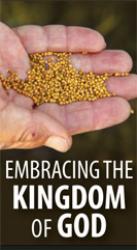
“Antiques Roadshow” is a perennial favorite among viewers of public broadcasting. Folks bring in all kinds of objects to discover the monetary values and also to share or learn more about the history of their particular items.
Some pieces and their accompanying stories have been handed down for generations. Other pieces were purchased at garage sales. Everyone is hoping to discover from the experts that their item is a treasure beyond compare.
It is fair to say that Jesus wants his listeners and his followers to discover that we too hold a treasure that is unique in all the world. It is not something we earn or can purchase at bargain basement prices. It is a gift that requires some effort to appreciate. It is an awareness of the kingdom of God in our midst; it is in fact the kingdom itself.
Matthew puts together two simple parables from Jesus to help us understand the value of this gift. Recall that for Matthew’s predominantly Jewish audience, “kingdom of heaven” is preferred, not to fix our eyes elsewhere but to avoid uttering the name of God.
“The kingdom of heaven is like a treasure buried in a field, which a person finds and hides again, and out of joy goes and sells all that he has and buys that field” (Matthew 13:44). It’s hard to imagine today why the person buries the treasure and then purchases it when he already had it in his possession. Perhaps the person was a simple laborer who unearthed the treasure while plowing his master’s field.
It would not have been unusual for people in ancient times to bury coins and valuable items when they were being invaded, for example. Later, others, like this laborer, would find the stash. Jesus does not dwell on whether the man should have told the landowner. Instead, the simple story focuses on the man’s zeal and his joy. He is “all in” and sells everything he has to possess the treasure.
A second short parable follows the buried treasure parable. “The kingdom of heaven is like a merchant searching for fine pearls. When he finds a pearl of great price, he goes and sells all that he has and buys it” (Matthew 13:45-46). This person is of the merchant class, and we can presume that he has some means to buy what he finds. He is searching for that one thing that will pay off, and when he finds it, he is ready to act.
Both men know that whatever else they have pales in comparison to what they find. Similarly, we are being invited to understand that whatever we possess in this life is of little value in comparison to the kingdom of God. Making the discovery of God’s kingdom in our midst is a cause for joy, for zeal and for a reordering of values.
In both parables, immediate and full possession is not possible without some personal investment. There is some time between discovery and ownership. Similarly there usually is time between our discovery of God’s care for us, and our complete surrender to this reality. There is time between Jesus offering us the kingdom of God and our ability to rid ourselves of lesser values in order to experience it fully.
On the “Antiques Roadshow,” not all participants go away finding they possess some valuable piece of art, jewelry or dinnerware. These folks may discover that their possessions are nonetheless valuable for sentimental reasons, or simply for enjoyment.
But what about those who discover that old painting they brought in is rare and its monetary value far exceeds what they imagined? Do they part with it at auction to make a profit? Or do they treasure it, hoping to pass it on to future generations? Such is the kingdom of God.
Catherine Upchurch is the general editor of the Little Rock Catholic Study Bible and contributes to several biblical publications. She writes from Fort Smith.
Please read our Comments Policy before posting.
Article comments powered by Disqus Vatican issues Mass readings to pray for self-restraint
Vatican issues Mass readings to pray for self-restraint
 Justice is a gift and a challenge
Justice is a gift and a challenge
 Jesus interested in how we love family and vulnerable
Jesus interested in how we love family and vulnerable
 Choose the simple route of singular devotion
Choose the simple route of singular devotion
 Don’t let misconceptions cause faith to waver
Don’t let misconceptions cause faith to waver
 Seniors, whatever storms may come, Jesus will be there
Seniors, whatever storms may come, Jesus will be there
 Studio 3:16 offers new approach to teaching religion
Studio 3:16 offers new approach to teaching religion
 After three decades, NLR principal plans to retire
After three decades, NLR principal plans to retire
 CHS athlete overcomes odds to reach collegiate goal
CHS athlete overcomes odds to reach collegiate goal
 St. Joseph a model of solidarity with immigrants
St. Joseph a model of solidarity with immigrants
 Two gifts after Jesus’ death: Virgin Mary and Eucharist
Two gifts after Jesus’ death: Virgin Mary and Eucharist
 Why we have an altar, and not just a communion table
Why we have an altar, and not just a communion table
 Pope: Wars should be resolved through nonviolence
Pope: Wars should be resolved through nonviolence
 Living relationship with Jesus Christ in the Eucharist
Living relationship with Jesus Christ in the Eucharist